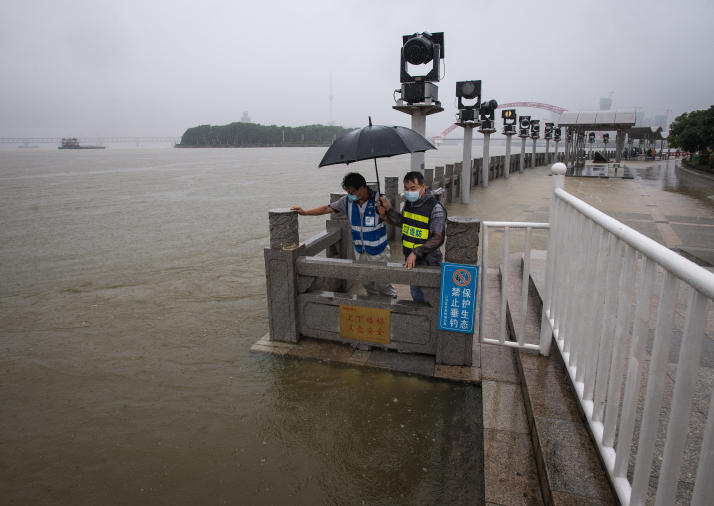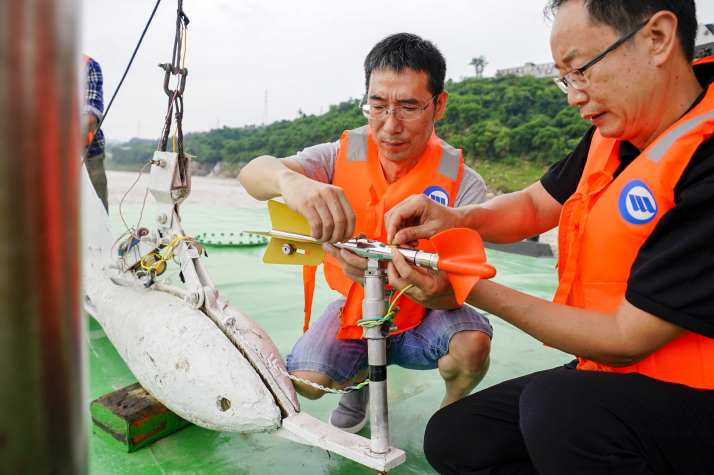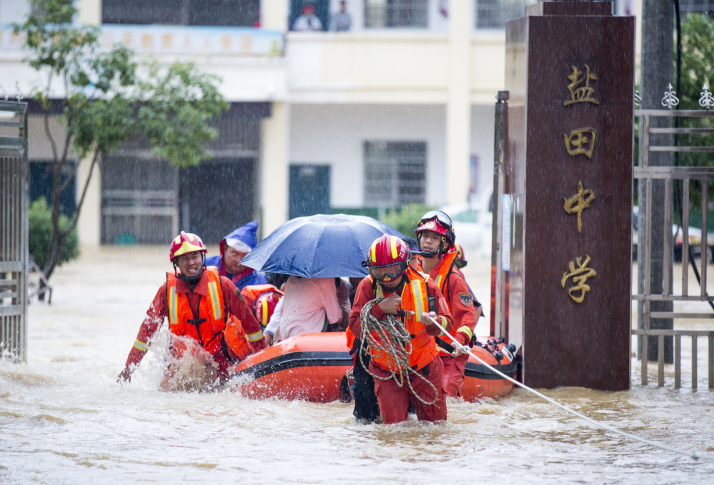|
||||||
|
||||||
| Home Nation World Business Opinion Lifestyle China Focus ChinAfrica Video Multimedia Columnists Documents Special Reports |
|
||||||
|
||||||
| Home Nation World Business Opinion Lifestyle China Focus ChinAfrica Video Multimedia Columnists Documents Special Reports |
| Nation |
| Flood control work intensifies as downpours continue |
| China steps up efforts to control flood during the flood season |
| By Lu Yan · 2020-07-10 · Source: NO.29 JULY 16, 2020 |
 Workers monitor the water level at Longwang Temple in Wuhan, capital of Hubei Province, central China, on July 6 (XINHUA)
When the call came at noon, it made Sun Yongbao, head of the fire brigade's special mission station in Yichang, Hubei Province in central China, spring into action. It was an SOS. A woman and her 3-month-old son were trapped in the flood. Sun, just back from a rescue mission that had saved two flood victims, rushed to the site with six firefighters. The woman and her son were in a building in 1-meter-deep water and the water level was rising still due to the rain. The firefighters jumped into the water. It rose up to Sun's chest. They had to hold on to a nearby railing to steady themselves and waded forward cautiously. Then they were inside the building and at the door of the caller. The pair were escorted out and carried to safety. The entire operation had taken less than 8 minutes. It was June 27. Yichang, located on the bank of the Yangtze River, has suffered from heavy rains this time of the year with standing water in urban areas and floods in low-lying areas.  Hydrological staff install a water flow meter on a fishing boat in Chongqing in southwest China on July 2 (XINHUA)
Flood season The flood season started in March in south China. In June, there were eight rounds of short-term thunderstorms, gales or hailstorms, according to Wang Zhihua, deputy head of Department of Emergency Response, Disaster Mitigation and Public Services of the China Meteorological Administration. Till early June, there had been 18 rounds of heavy rain, according to the Ministry of Water Resources. In particular, heavy rainfall continues to lash south China, leading to loss of lives and heavy economic damage. Wang said more rainfall is expected in the south. Precipitation could reach 100 to 300 mm in areas along the Huaihe, Hanjiang and Yangtze rivers and in parts of southwest China, about 50 to 80 percent more than in previous years. "The rain in July and the accumulated impact of the rain in June will raise the risk of floods and other geological disasters in these areas," he warned. People's lives have been disrupted severely. Nearly 500 students were caught in waters as deep as 1.6 meters at their boarding school in Huangmei, a county in Hubei, on July 8, the last day of the critically important national college entrance examination, known as the gaokao. Combined rescue efforts by the police and other departments resulted in the trapped students being able to take the examination or supplementary ones.  Rescuers evacuate students as their school in Duchang County, Jiangxi Province in east China, was deluged by storm-triggered flood on July 8 (XINHUA)
Frontline workers Zhang Li, a member of the Communist Party of China in Hunan Province in central China, is among the frontline workers trying to ensure the safety of people's lives and property. On June 22, he was up all night in Gaopo, a sub-district in the city of Huaihua, as it was raining heavily and he wanted to be prepared for any ensuing emergency. After midnight, the local authority activated the highest flood control emergency response. Zhang and other colleagues went out to patrol and identify areas at risk of flood. He received a call notifying him that a community was flooded and some people were still trapped in their apartments. The patrol reached the flooded area, swam to the building and went knocking door to door to check if anyone was still in. Some people were still inside, including Li Youzhi, a 57-year-old with disability and hearing disorder. All the people were taken to a safe place. Zhang thinks Party cadres have a special responsibility during extreme times like this to monitor high-risk areas, and organize rescue work when needed. Like Zhang, Wei Yin, a highway traffic policeman in Anqing, Anhui Province in east China, has been working during the flood season to assess risks, clear roads and tackle traffic congestion. Wei's patrolling beat is a nearly 130-km road. It takes about two hours to go back and forth when everything is well. Since the flood season, he and his team have been patrolling various road sections every day. When there is a problem, their work is to address it as fast as possible to ensure people are safe and the high-speed traffic can resume. Ye Jianchun, Vice Minister of Water Resources, said at a press conference on June 11 that the ministry has urged local governments to make contingency plans to protect people's lives in case the existing facilities are inadequate to prevent floods. The ministry has been working with other authorities to improve the flash flood warning system so that people living in high-risk areas receive early warning. Ye said all efforts would be made to protect Hubei from floods. The province had suffered the most during the novel coronavirus outbreak. Due to its large number of rivers and lakes, flood control in the province is a challenging task even without the epidemic. Ye said flood control work started in Hubei in February and the province has done a good job under difficult circumstances. To eliminate potential hazards, renovation of the buildings damaged in previous floods in Hubei will be speeded up, he added. As of July 5, fire rescue teams nationwide had participated in over 2,900 flood relief cases, rescued more than 6,000 people and evacuated more than 30,000 people, according to the Ministry of Emergency Management. Safety information is being disseminated to the public regularly. At a press conference on July 3, Zhu Dingzhen, a senior expert with the China Meteorological Administration, said people should follow weather forecasts, avoid going to mountains or low-lying areas amidst heavy rain, and move to higher ground as soon as possible when torrents or mudslides occur. (Print Edition Title: Troubled Waters) Copyedited by Sudeshna Sarkar Comments to luyan@bjreview.com |
About Us | Contact Us | Advertise with Us | Subscribe
|
||
| Copyright Beijing Review All rights reserved 京ICP备08005356号 京公网安备110102005860号 |